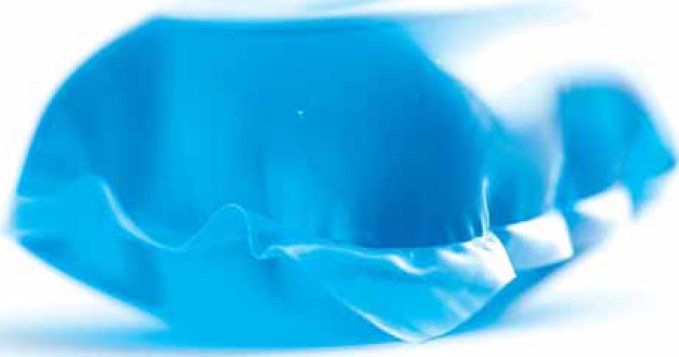PVA is the plastic that most of us are likely to have encountered as a silky water-based white wood glue. In the context of designing with polyvinyl alcohol, as well as its use as an adhesive, its other main use is still in liquid form but for coatings for papers, textiles and finishing for leather. In terms of use for three-dimensional mouldings, it is limited due to its water solubility.
There are a few suppliers who sell polyvinyl alcohol-based resins, but one of the most interesting examples is its availability as a water-soluble yarn. The dissolving process, which can be set to activate at any temperature from 30–95ºC (86–203ºF), also leads to another unique property. During the process, the fibres will shrink by 50 per cent before they dissolve. This quality is useful in the textile industry where this fibre, one brand name is Solvron®, can be added to textiles where a mechanical pulling force is needed, in items such as filters and medical bandages, but it is also used as a sacrificial material during the production of garments.
The world is filled with many natural fibres – an area that is growing rapidly – and synthetic fibres that are leading to some incredible, smart textiles. However, what’s interesting with PVA yarns is that they perform a smart function with a fairly low-key and biodegradable ingredient as its basis.
Image: Laundry tablets with PVA capusule

Sources
PVA in a mouldable form has limited availability compared to many other plastics.
Cost
£0.75 ($1.20) per kg.
Sustainability issues
The environmental benefits of PVA are clear: it is biodegradable and water-soluble.
Production
The moulding of polyvinyl alcohol through melting is difficult because the melting point and degradation temperature are very close. However, some suppliers offer pelletized polyvinyl alcohol, which can be processed with conventional plastic technology, such as blown and flat-film extrusion as well as injection moulding. It can also be used as an additive to enhance biodegradable materials due to its own water-soluble properties.
Typical applications
Apart from adhesives and yarn, the water-solubility of PVA has resulted in a range of plastic films for packaging. One area it is used in is fishing, where bait is put into PVA bags and then into the water, this allows a concentration of bait in the water while the bag itself dissolves. This same principle is exploited in laundry tablets, where a liquid detergent is enclosed within PVA capsules that then dissolve in the machine. The crystalline structure of PVA allows it to polarize light leading to applications for light filters such as dichroic polarizers.
Derivatives
–Solvron®
–Mowiol®
–Poval®
–Mowiflex®
| + | – |
|
–Biodegradable –Water soluble –High tensile strength –Light polarization qualities |
–Limited availability compared to other plastics |
